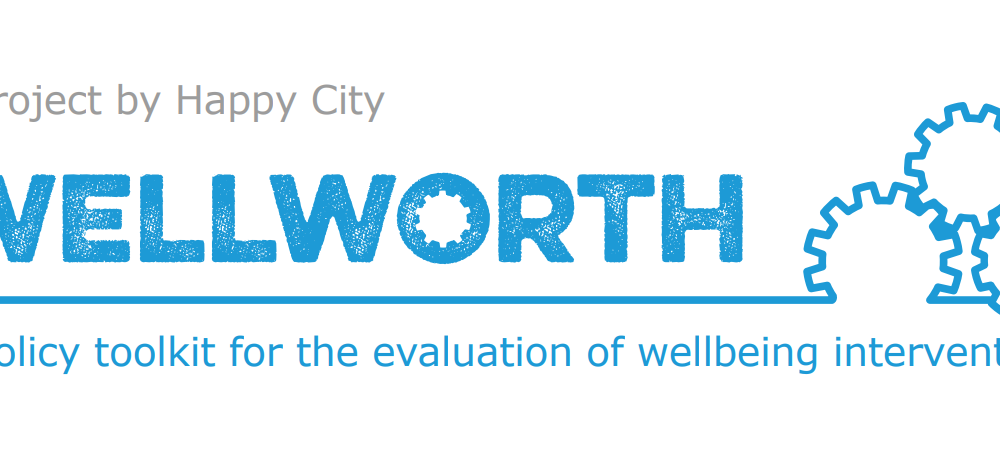WellWorth was a prototype online tool developed in 2015-16, helping policy and decision makers evaluate wellbeing interventions. WellWorth was developed by Happy City in partnership with health economists at the University of Exeter’s European Centre for Environment and Human Health. The feasibility development of WellWorth was funded by Innovate UK ‘Solving urban challenges with data’ competition stream from October 2015 – October 2016.
WellWorth was designed to be useful for both one-off projects and measuring activity over a period of time. The academic research resulted in a tool designed to allow any organisation to enter data from a recognised wellbeing data source which the tool converted into an overall life satisfaction score. This score, together with other information such as project duration and reach, was converted into mainstream policy outcomes. The tool provided users with a choice of mainstream policy areas to select from; health, education, social relations, employment, environment and crime. WellWorth helped to show which services or projects have most impact in what areas whilst also calculating the cost effectiveness of projects.
The rationale behind the project
Various robust ways of gathering wellbeing data have been developed and there is a significant body of academic and applied knowledge and work in the area of wellbeing. However wellbeing or life satisfaction data on its own is of limited value, and many organisations would like to extract more meaningful information to show how it impacts fundamental life outcomes such as mortality rate, level of educational achievement and the ability to work productively. To ensure the appropriate allocation of resources towards wellbeing, and to justify investment in wellbeing interventions it is helpful to have a more complete picture of the benefits of wellbeing and to value them in monetary terms. This enables a clearer comparison with the costs of wellbeing interventions. Robust valuation is central to cost-benefit analysis and to avoid undervaluing policies that promote non-market services such as volunteering which are not obviously reflected in GDP.
How does WellWorth work?
WellWorth was built on a framework of algorithms. These algorithms were based on calculations derived from an extensive academic literature review. It tool drew on this wide scope of research into methods of quantifying linkages between wellbeing and different life outcomes, to place a monetary value on those.
The review considered:
- Empirical evidence showing the extent to which wellbeing can lead to better life outcomes
- Valuation methods used to place monetary values on the benefits of wellbeing.
The literature review considered both direct benefits i.e. the intrinsic value of wellbeing and also the cobenefits in the following domains: Health, Social relations, Voluntary work, Employment, Education, Environment and Crime.
You can find an evidence review for each of the domain headings here.
To download a full overview of the WellWorth tool please click here
Wellworth was very well received, but we have not been able to develop the tool beyond protoype stage due to the requirement to regularly update the data behind the algorithms, in order to ensure it is using the best available research and evidence on wellbeing impact. We would be happy to hear from any academic or policy organisation who is interested in partnering with us to build on the excellent work started by the European Centre for Environment and Human Health at Exeter University. If your organisation is interested in WellWorth please contact us at info@happycity.org.uk.



Comments are closed.